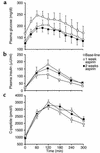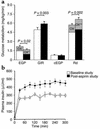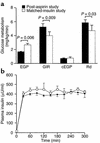Mechanism by which high-dose aspirin improves glucose metabolism in type 2 diabetes
- PMID: 12021247
- PMCID: PMC150979
- DOI: 10.1172/JCI14955
Mechanism by which high-dose aspirin improves glucose metabolism in type 2 diabetes
Abstract
Recent studies have implicated fatty acid-dependent activation of the serine kinase IKKbeta, which plays a key role in tissue inflammation, in the pathogenesis of insulin resistance. High doses of salicylates have recently been shown to inhibit IKKbeta activity and might therefore ameliorate insulin resistance and improve glucose tolerance in patients with type 2 diabetes. To test this hypothesis, we studied nine type 2 diabetic subjects before and after 2 weeks of treatment with aspirin ( approximately 7 g/d). Subjects underwent mixed-meal tolerance tests and hyperinsulinemic-euglycemic clamps with [6,6-(2)H2]glucose to assess glucose turnover before and after treatment. High-dose aspirin treatment resulted in a approximately 25% reduction in fasting plasma glucose, associated with a approximately 15% reduction in total cholesterol and C-reactive protein, a approximately 50% reduction in triglycerides, and a approximately 30% reduction in insulin clearance, despite no change in body weight. During a mixed-meal tolerance test, the areas under the curve for plasma glucose and fatty acid levels decreased by approximately 20% and approximately 50%, respectively. Aspirin treatment also resulted in a approximately 20% reduction in basal rates of hepatic glucose production and a approximately 20% improvement in insulin-stimulated peripheral glucose uptake under matched plasma insulin concentrations during the clamp. In conclusion, these data support the hypothesis that IKKbeta represents a new target for treating type 2 diabetes mellitus.
Figures



References
-
- De Fea K, Roth RA. Protein kinase C modulation of insulin receptor substrate-1 tyrosine phosphorylation requires serine 612. Biochemistry. 1997;36:12939–12947. - PubMed
-
- Schmitz-Peiffer C, et al. Alterations in the expression and cellular localization of protein kinase C isozymes epsilon and theta are associated with insulin resistance in skeletal muscle of the high fat fed rat. Diabetes. 1997;46:169–178. - PubMed
-
- Hotamisligil GS, Shargill NS, Spiegelman BM. Adipose expression of tumor necrosis factor: direct role in obesity-linked insulin resistance. Science. 1993;259:87–91. - PubMed
Publication types
MeSH terms
Substances
Grants and funding
LinkOut - more resources
Full Text Sources
Other Literature Sources
Medical
Research Materials
Miscellaneous

